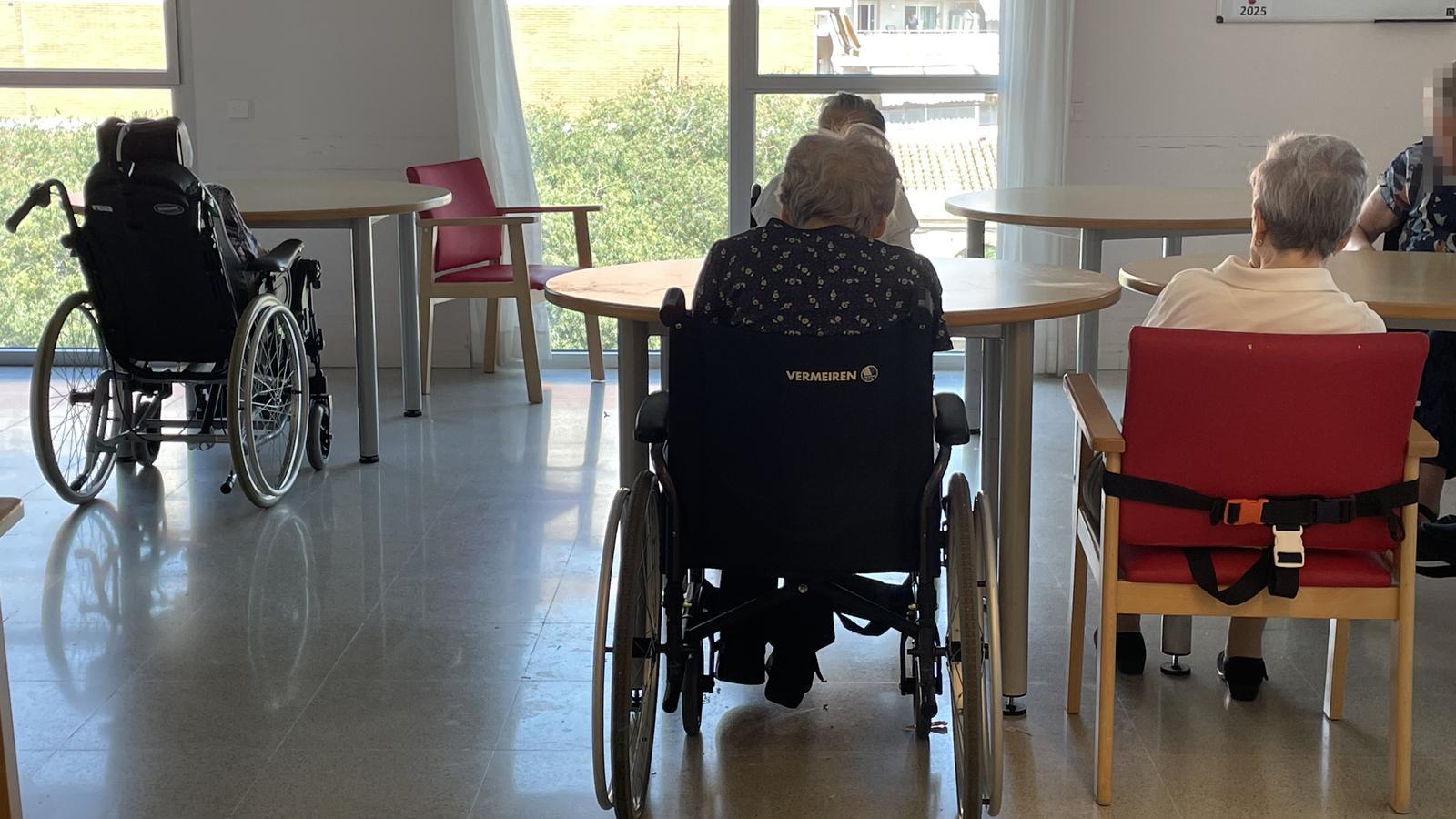"They've mixed cold gazpacho with hot cannelloni to feed the elderly more quickly."
The ARA witnesses what daily life is like in a Generalitat nursing home for senior citizens.


BarcelonaA dozen people are sitting in the living-dining room. Some in wheelchairs, others in armchairs. Almost all of them are women, half asleep, their heads tilted, even though it's only 10:00 a.m. and they've been out of bed for two hours. A José Luis Perales song plays in the background from a television that's on. The only ones who seem awake are a couple of elderly women cradling dolls, and another woman running the palm of her hand over the tables as if dusting, although she doesn't have a cloth. In the living-dining room, no geriatric assistant is watching. The two working this morning on the third floor of the residence are too busy attending to other patients.
Relatives of twelve of the twenty elderly people living on the third floor of the Alchemika residence in Barcelona have filed a joint complaint with the Ombudsman, believing that the center does not meet basic and quality standards. They complain about the lack of nursing home staff, the few times their relatives' diapers are changed per day, the lack of supervision, and few medical checkups.
The third floor houses elderly people who suffer from some type of dementia or cognitive impairment. "Unlike other floors, there is no one who can express themselves lucidly and complain about what is happening," says the family representative, Elisabet March. "We don't want a repeat of what happened to my father, when I found him defecated and pissed up to his neck twice, and he ended up dying of an infection."
This journalist has visited the third floor of the Alchemika residence three times for several hours, without identifying herself as a reporter, to see what daily life is like.
"We have to get Juana out of bed first, her daughter is about to arrive," one geriatrician tells another to hurry up and get the woman ready before the visitor arrives. The other geriatrician was about to take another elderly woman to the bathroom, but she leaves her sitting in the living room and won't take her there again all morning.
No supervision
On the third floor, after breakfast, the geriatric assistants are in charge of taking the residents to the bathroom one by one. The process is laborious. Most cannot stand and must be lifted with a hoist and transferred in wheelchairs. During this entire time, the living-dining room is left unsupervised.
"Don't get up, look at the lump on your head from standing up alone," a geriatric assistant tells a grandmother with a plaster on her forehead as she tries to stand. Two other people are tied with some kind of belt so they can't move from the chair. "I myself authorized restraints for my mother to prevent falls that could have worse consequences. The caregivers do everything they can, but they can't be in two places at once," explains Inés Martínez, the daughter of one of them.
During mealtimes, some elderly women eat alone, but even so, the geriatric nurses must be on top of them, constantly repeating, "Come on, honey, eat." Others have to have food placed directly in their mouths. In any case, everyone must have eaten in less than an hour. "Sometimes they mix the first course with the second to go faster. They've even mixed cold gazpacho with hot cannelloni," another family member says.
In the hallway, there's a calendar detailing the activities that supposedly take place each day at the residence. However, some days nothing is done on the third floor, even though the calendar indicates otherwise. This morning, an occupational therapy workshop is being held. A technician distributes several photographs among the residents to try to get their attention, but most are still sleeping and don't even open their eyes. Afterward, she gives a brief arm massage to a couple of elderly women, cuddles with another, and then ends the workshop, although she barely interacts with the rest.
Falls and absenteeism
Alchemika is a 108-bed public nursing home, owned by the Generalitat (Catalan government) but managed by the Pere Mata Social organization. It is a spacious, bright center with single rooms, and air conditioning is always available at this time of year. It also has a participation council with representatives from the administration, the center's management, staff, residents, and family members. Data is reported annually that private nursing homes would be unlikely to make public. For example, in 2024, 101 falls were recorded among the center's residents, 37 complaints were received, and the average absenteeism rate was 10%, according to the minutes of the meeting held on April 3, which ARA has had access to.
"The ratio of geriatric assistants at the Alchemika residence exceeds regulatory requirements; this has been confirmed by all the documentary reports, on-site reviews, and inspections carried out by the Generalitat's own resources department and the Inspection Department," a source emphasized. UGT union representative and geriatric assistant Clara Castillo corroborates this: "There is no shortage of geriatric staff. I have never worked in a residence as well as this one."
Current regulations establish that there must be 25 geriatric assistants for every 100 elderly people with a level two dependency. This does not mean that all these geriatric assistants work simultaneously, since they must cover all shifts throughout the day, 365 days a year. For practical purposes, each caregiver will care for at least ten people. During the night, the ratio is even lower: the regulations state that three assistants are sufficient for 150 elderly people.
This regulation dates from 2014 and has not been updated since then, although the level of dependency among nursing home residents has only increased. Does the Government plan to modify it? "The current ratio guarantees sufficient presence to continuously and adequately address the needs of all residents," respond in writing to sources from the Department of Social Rights, who declined an interview with ARA on the matter.
Currently, there are 966 senior residences in Catalonia, of which only 126 are public. However, the Social Rights Department partially or fully funds 44,158 nursing home places, equivalent to 72% of the total. Last year, it allocated €1.174 billion. An increase in the staffing ratio would undoubtedly mean much more money.
